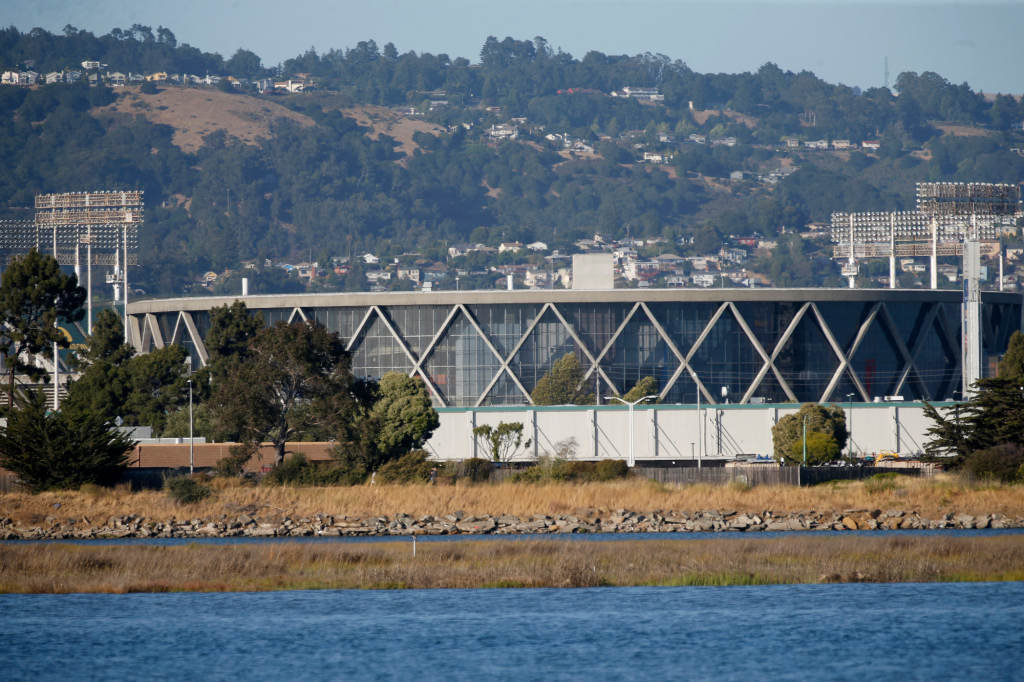OAKLAND — An Oakland-based development group wants to buy the city’s share of the Coliseum site with the aim of landing a professional women’s basketball team to play in the same arena where the Warriors won three championship titles over the past decade.
Ray Bobbitt, founder of the African American Sports and Entertainment Group, said Monday the organization is negotiating with the Women’s National Basketball Association to bring an “African American women-led” team to Oakland.
Leading that effort is business owner Shonda Scott, one of Bobbitt’s partners and an Oakland native who played basketball at Holy Names High School.
As the group prepares its formal request with the WNBA, the idea has garnered some support from community and city leaders.
“We know that the City of Oakland and the East Bay region is one of the greatest sports fan bases in the world and will be eager to support a WNBA team,” LaNiece Jones, executive director of the Oakland-Berkeley chapter of Black Women Organized for Political Action, wrote in a letter to the Oakland-Alameda County Coliseum Authority board.
“No professional sports league was more essential to the social justice movement in 2020 than the WNBA,” she added. “This team and its ownership group will be an inspiration to the girls and young women in our community.”
The Coliseum Authority board at its meeting on Friday will discuss submitting a lease and license agreement as part of the group’s formal proposal to bring an WNBA team to Oakland.
Referencing a recent Sports Illustrated cover story about growing interest in the WNBA, Oakland Vice Mayor Rebecca Kaplan told this news organization in a text: “Oakland, with a strong and dedicated fan base, and a ready-to-use great basketball arena that’s easy to get to, is a perfect place for a new WNBA team.”
A women’s basketball team would be a key element of an ambitious plan Bobbitt and his partners have been envisioning for the Coliseum site, where they also want to build housing, office space, retail, a life sciences campus and a stadium for an NFL team, Bobbitt said.
“East Oakland really needs the development,” Bobbitt said, citing a need to stem the crime and displacement that has plagued the area’s neighborhood.
He and others in the group, including former Oakland city manager Robert Bobb, say their plan offers a chance to create a Black business district and inject jobs and economic development.
In submitting their $92.5 million bid to buy the city’s share of the Coliseum, Bobbitt and Bobb are partnering with African American-owned investment firm Loop Capital, Oakland developer Alan Dones and sports agent Bill Duffy, Bobbitt said.
Theirs is one of several groups that have expressed interest in buying the city’s share of the Coliseum in recent years. Alameda County agreed to sell its share in 2019 to the Oakland A’s for $85 million, so any group that buys the city’s half will have to work with the baseball team, which currently plays at the Coliseum but has been pining for the city’s permission to let it build a waterfront ballpark at the Port of Oakland’s Howard Terminal while it develops housing, retail, office space and parks at the Coliseum.
The A’s have offered to buy the city’s share of the Coliseum for the same $85 million it paid the county. Other bids bids include one from former A’s pitcher Dave Stewart, who reportedly offered $115 million for the city’s share.
According to city staff, other potential buyers include Tripp Development and the Renaissance Companies, which is owned by Floyd Kephart, who once had a negotiating agreement to explore rebuilding the Coliseum arena and stadium.
The City Council on July 20 is scheduled to consider approving a term sheet with African American Sports and Entertainment Group for the Coliseum site, but it’s unclear whether the other groups that had expressed past interest in buying the city’s portion will also be part of the discussion.
On that same day, the council also is scheduled to consider a non-binding term sheet for the A’s Howard Terminal proposal. The A’s want a promise from the city to keep negotiating over the waterfront ballpark project.
Bobbitt said his group is eager to get the pieces into place. Raised in East Oakland, Bobbitt sees the opportunity to develop the Coliseum site to help stabilize the area by providing good jobs and economic opportunities.
The city has not released its own analysis of the proposal or any others, but Bobbitt estimates his group’s plan could create about 40,000 jobs.
That’s important, he said, as the city reels from a spike in violence over the past year and is still grappling with the economic fallout of the COVID-19 pandemic.
“We can’t really wait much longer,” he said.










